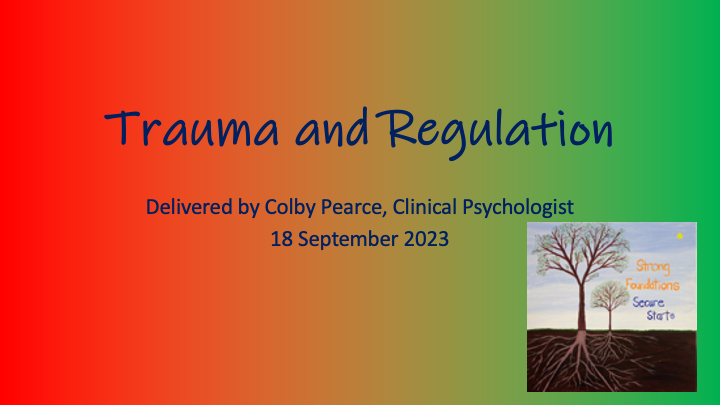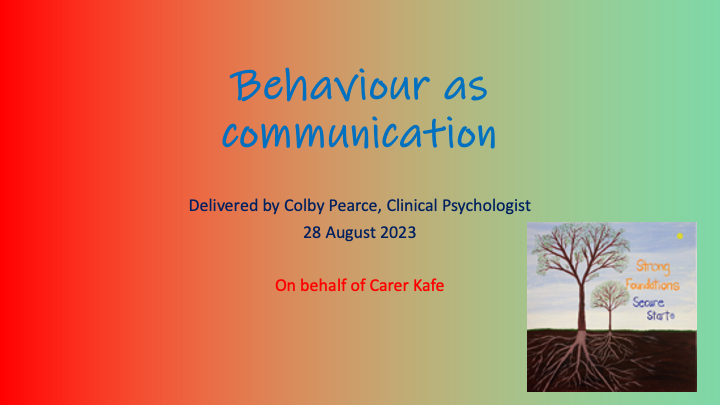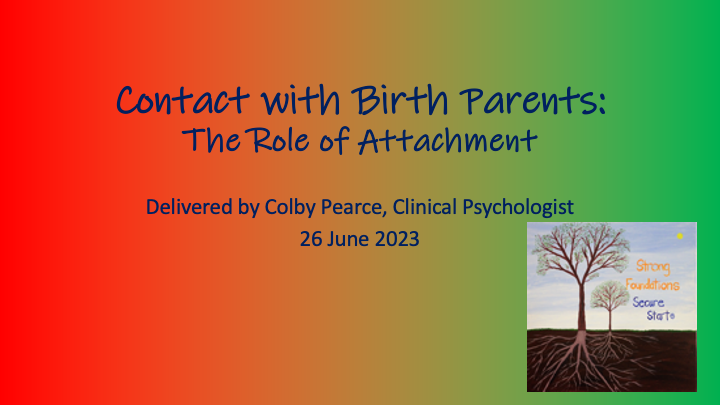Welcome. From this page you will be able to purchase handbooks (PDF Versions) from my self-paced learning programmes, and selected other content. Each handbook is for individual purchasers, only. The handbook is in PDF form, and will be emailed to you for download to your device. Please allow up to 24 hours the for processing of your purchase.
Trauma and Regulation
This handbook is a PDF version of a two-hour talk to kinship carers of Australian Aboriginal Children, delivered on September 18, 2023. The brief for this talk was to deliver content on how early trauma impacts the developing in central nervous system and how to regulate known challenges that arise. In preparing for delivery I was acutely aware of how multi-faceted the topic is and that broad coverage goes beyond the time set aside for this session. To support access to additional information of relevance to the topic I have included links to other sources of information, including other self-paced learning modules I have made available on the Secure Start site. The module is relevant to carers of all children and young people recovering from a tough start to life, including foster and kinship carers, residential carers, teachers and educators.

Trauma and regulation
A PDF version of the self-paced learning module of the same name.
A$10.00
Behaviour as Communication
This handbook derives from a 1.5 hour talk delivered on behalf of the Carer Kafe, on 28/8/23. It covers how children learn language and what happens for language development and use when care is grossly inadequate during the early developmental period. There is guidance on how to promote the development of inner state language and the motivation to use it, as well as a model for enriching the young person’s experience of being heard and validated in their experience by seeing their behaviour as reflecting key aspects of their inner world and experience.

Behaviour as Communication
A PDF handbook accompanying the self-paced learning module of the same name.
A$10.00
Self-Care for Carers
This is an adaptation of the third module in the series Responding Therapeutically to Complex and Challenging Behaviours: A Triple-A Approach. The module explains how our thinking is influential in our own wellbeing as well as the wellbeing of children and young people who are recovering from a tough start to life.
You can purchase the Handbook for this self-paced learning module here:

Self-Care for carers of children and young people recovering from a tough start to life
Drawn from Responding Therapeutically to Complex and Challenging Behaviours, this module delivers a methodology for supporting the wellbeing of carers of children and young people recovering from a tough start to life.
A$9.00
Early Trauma: The infant’s Experience (Expanded)
Across the past twenty -eight years I have worked continuously in the child protection space, as an employee and independent contractor for the statutory child protection body in South Australia. I have supported teams who work in child protection and out-of-home care. I have developed and delivered programs in South Australia and Ireland.
In my work I have observed the immediate and longer-term impacts of relational trauma in the early developmental period, which I present about in this self-paced learning module. I also give some coverage of conventional aspects of parenting and relating that might be expected to address the impacts of early trauma at home.
Click here to enter the module, and purchase the PDF Handbook below.

Early Trauma: The Infant’s experience (Expanded)
This PDF Handbook was developed alongside the self-paced learning module of the same name.
A$10.00
Making Decisions about Contact with Birth Parents: The Role of Attachment
Welcome to this self-paced learning module.
I originally delivered the content of this module to kinship carers caring for children who could not safely be cared for at home by their mum and/or dad, and professionals who support them. In delivering this content I was asked to consider the following questions:
- Why is contact with birth parents important?
- Should contact stop if birth parents do not attend inconsistently?
- Should contact stop when children have an adverse reaction to it?
I subsequently wrote this module for all adults who are involved in the care of children and young people who are cannot be safely cared for at home.
I want to preface the module by letting you know about what has informed my contemporary views about contact between these children and young people and their birth parents.
For the past twenty-eight years I have worked continuously, in various roles, in child protection. Among those roles, the most enduring have been therapeutic work with the children and young people and the provision of therapeutic caregiving support and guidance to adults who care for them at home and in other domains of their life (social workers, teachers). I have talked to a lot of children and young people in care, as well as adults who interact with them in caregiving and professional roles.
As the years have passed, I have remained connected to, or reconnected with, young adults who I knew when they were in out-of-home care. I have seen the longer-term outcomes of decisions made years prior about contact between children and young people and their birth parents. I have reflected on what theories that underpin practice in this sector, most notably Attachment Theory, provide by way of explanation for observed outcomes.
The conclusion I have come to, based on my work and reflections about childhood attachment, is that both strongly support the case for working towards and maintaining healthy connection between children and young people who cannot be cared for at home and their mum and/or dad, where possible.
An important caveat I will acknowledge is instances where the child or young person has been sexually abused by a parent, or cases of extreme and/or sadistic abuse. These are topics for other modules. Rather, I consider that the content of this module holds true for most children and young people in out of home care; that is, those children and young people who could not safely be cared for at home due to grossly inadequate care and protection.
I would also like to acknowledge that this can be a very sensitive topic; especially for carers of children and young people who are distressed or otherwise unsettled by contact with birth parents. It is not my intention to minimise this issue but, rather, shed some light on what may be happening for the child or young person, and propose a way forward.
Finally, before you progress, I would advise that this module is intended to be widely applicable. As such, it does not replace professional advice and guidance in individual matters and may not be appropriate in all circumstances. I recommend that you consult with your colleagues and supporting professionals before implementing recommendations derived from this learning module.
Click here to enter the self-paced learning module, and purchase the handbook, below.

Making Decisions About Contact with Birth Parents Handbook
This handbook was developed for use alongside the self-paced learning module: Making Decisions about Contact with Birth Parents: The Role of Attachment.
A$20.00
Supporting Strong Developmental Outcomes with CARE
Thank you for your interest in this self-paced learning module, and for your interest in my work.
Across the past twenty-eight years I have been speaking to children and young people who are recovering from a tough start to life, and the adults in their life. I have drawn from this experience in the development of this self-paced learning module.
This module is suitable for anyone with a caring concern for children and young people, especially children and young people who are recovering from a tough start to life. I anticipate that parents, foster parents, kinship carers, educators, and professional will all draw something of value from this module.
After completing this learning module I anticipate that you will have a better understanding how caregiving can be optimised to assist children and young people recovering from a tough start to life to achieve their potential. You will be able to develop a simple parenting plan that I anticipate is practical to implement and beneficial to the children and young people in your care.
This learning module will provide a solid orientation for other self-paced learning modules that can be found at this site.
Click here to enter this self-paced learning module, and purchase the handbook below.

Supporting Strong Developmental Outcomes with CARE
This handbook was developed for use alongside the self-paced learning module: Supporting Strong Developmental Outcomes with CARE.
A$9.00
Early Trauma: The Infant’s Experience
Thank you for your interest and for visiting this page. I am Colby Pearce and I am a Clinical Psychologist in Australia. I have been working with and talking to children and young people recovering from a tough start to life, and adults who interact with them in various roles, for almost twenty-eight years. My experience affords me the opportunity to speak to the experience of children and young people who are recovering from abuse, neglect, and/or family trauma, and their parents and other adults who engage with them in various roles.
Importantly, my experience provides a basis for me to help adults with a caring concern for these children and young people better understanding and respond therapeutically to them.
In this short presentation I was invited by Tweddle Child and Family Health Service to speak to the infant’s experience of early trauma. I delivered this presentation in June 2022 in Melbourne as part of Infant Mental Health Week. Click the link below to access the presentation slides and text associated with them. I hope you find them useful in your interactions and work with children and young people recovering from a tough start to life, and adults who engage with them in various roles.
Click here to access the presentation slides and associated text, and purchase the handbook below.

Early Trauma: The Infant’s experience
A PDF Handbook of the text associated with my presentation on the topic.
A$5.00
If you have not already, do take a look at my video titled “Sam’s Story”, which I have published to YouTube. It tells a story of how early trauma shapes the development of children and young people, and was developed for young people and those who care for them.
Disclaimer
The information contained on this page (and all links) is prepared for general applications. Though it derives from the author’s extensive experience delivering content and working therapeutically with children and young people recovering from a tough start to life and adults who interact with them, it may not be suitable in some circumstances and should not replace individualised therapeutic interventions.









